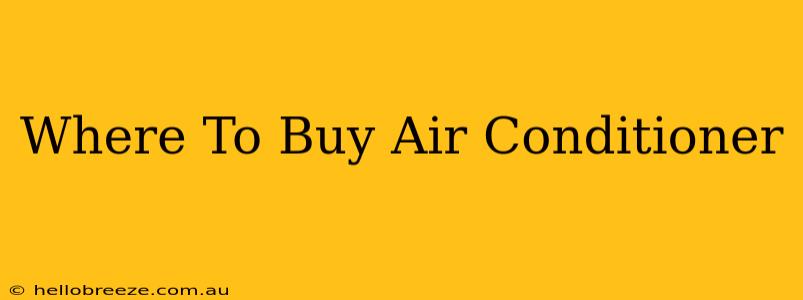Summer's heat got you sweating? Finding the right air conditioner can feel as daunting as a heatwave itself. But don't worry! This guide will help you navigate the world of AC units and pinpoint the best place to buy an air conditioner that fits your needs and budget.
Online Retailers: Convenience at Your Fingertips
Shopping online offers unparalleled convenience. You can compare models, read reviews, and often find great deals from the comfort of your home. Here are some top contenders:
Amazon:
- Pros: Huge selection, competitive pricing, customer reviews, fast shipping. Often features deals and discounts.
- Cons: Can be difficult to assess the quality of certain brands solely based on online reviews. Returns may be more complex.
Best Buy:
- Pros: Known for their knowledgeable staff (if you call for assistance), often carries higher-end models, offers in-store pickup options.
- Cons: Prices may be slightly higher compared to purely online retailers.
Home Depot & Lowe's:
- Pros: Wide selection of brands and models, often have installation services available, convenient locations for in-store pickup or browsing.
- Cons: Online prices may not always match in-store prices.
Brick-and-Mortar Stores: The Touch and Feel Experience
For those who prefer a hands-on approach, visiting a physical store allows you to see, touch, and compare different air conditioner models in person.
Local Appliance Stores:
- Pros: Often offer expert advice, personalized service, and potentially better installation options. May also have unique or hard-to-find brands.
- Cons: May have a smaller selection than larger retailers. Prices may be higher.
Big Box Stores (Best Buy, Home Depot, Lowe's):
- Pros: Convenient locations, wide selection, often have financing options.
- Cons: Sales staff may not always be highly knowledgeable about specific AC models.
Factors to Consider Before You Buy:
Before you start browsing, consider these key factors to ensure you find the perfect air conditioner:
-
Type of AC: Window, portable, central, ductless mini-split? Each type has its own advantages and disadvantages in terms of cost, installation, and cooling capacity. Knowing which is best for your space is crucial.
-
BTU Rating (British Thermal Units): This indicates the cooling capacity of the unit. A higher BTU rating means more cooling power, but you'll need to accurately calculate the BTU requirements for your room or home size to avoid overspending or undercooling.
-
Energy Efficiency (SEER Rating): The Seasonal Energy Efficiency Ratio (SEER) measures how efficiently the air conditioner uses energy. A higher SEER rating means lower energy bills.
-
Features: Look for features like programmable thermostats, smart home integration, dehumidification, and quiet operation.
-
Budget: Air conditioners range in price from a few hundred dollars to several thousand. Setting a budget beforehand will help you narrow down your choices.
Tips for Getting the Best Deal:
- Shop around: Compare prices from different retailers before making a purchase.
- Check for sales and discounts: Many retailers offer sales on air conditioners during the summer months.
- Read reviews: See what other customers have to say about specific models before you buy.
- Consider extended warranties: These can provide peace of mind in case of repairs.
Finding the right air conditioner can be a breeze with a little planning. By considering your needs and utilizing this guide, you'll be well on your way to a cool and comfortable summer!

